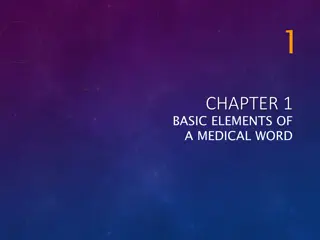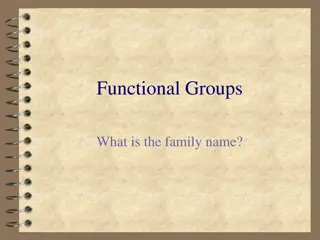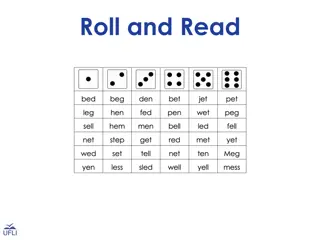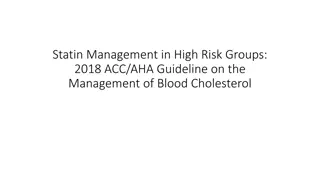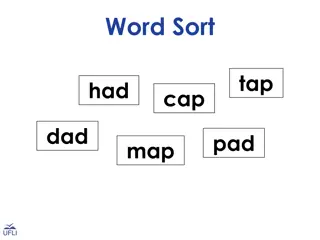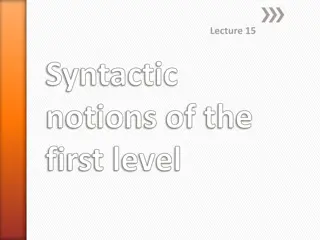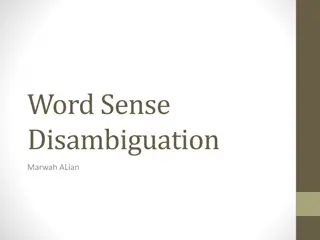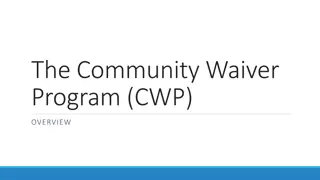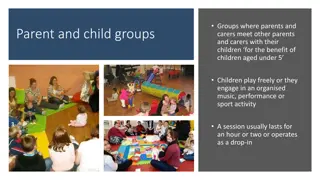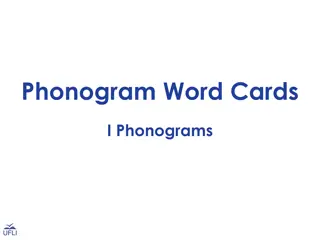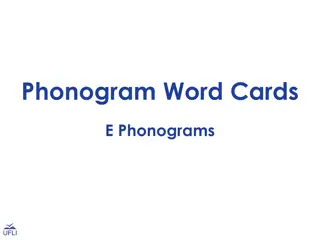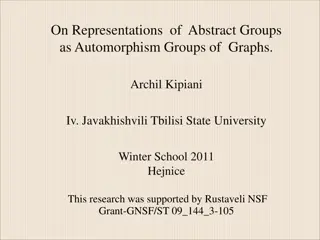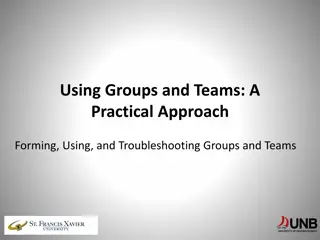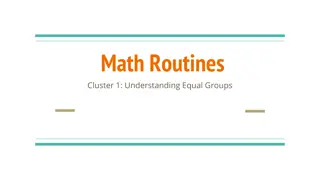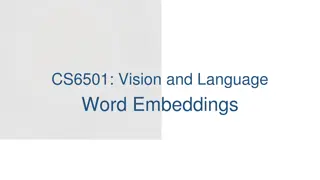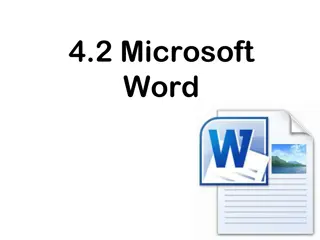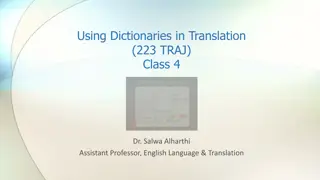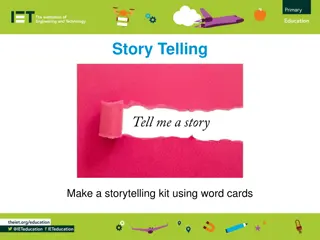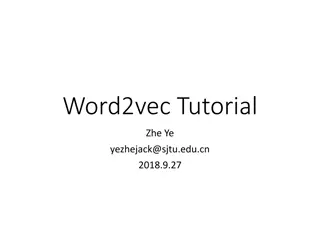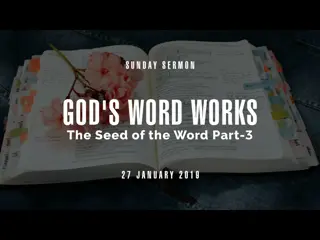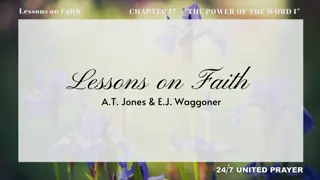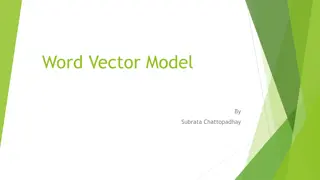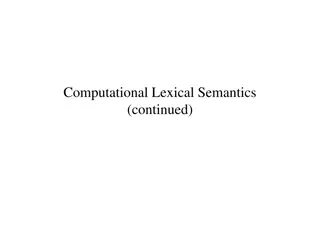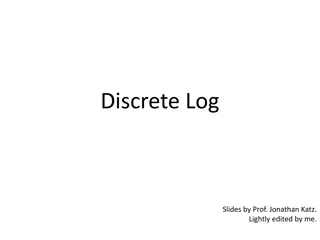Types of groups and reactions
This information discusses electron-donating groups (EDGs) and electron-withdrawing groups (EWGs), their effects on molecule reactivity, examples of each group, nucleophiles, and electrophiles. EDGs increase electron density, making nucleophiles stronger, while EWGs decrease electron density, making
0 views • 14 slides
Class Groups Are They the Future of Collaborative Learning
The traditional classroom setting, with rows of students facing a teacher at the front, has dominated education for centuries. However, the rise of technology and the evolving needs of the 21st century workforce are pushing the boundaries of learning. Enter Class Groups, a concept that reimagines th
4 views • 3 slides
Understanding Medical Word Elements: Roots, Combining Forms, Suffixes, and Prefixes
Medical terminology uses word elements like roots, combining forms, suffixes, and prefixes. Word roots provide the main meaning, combining forms connect elements, suffixes modify word meaning, and prefixes are placed at the beginning of words. Examples illustrate how these elements are used in medic
6 views • 13 slides
Understanding Functional Groups in Organic Chemistry
Functional groups in organic chemistry are specific groups of atoms within molecules that determine the chemical properties of the compound. This content provides visual representations and descriptions of various functional groups such as alkanes, alkenes, alcohols, aldehydes, acids, and esters. Le
0 views • 38 slides
Fun Word Reading Practice with Roll and Read Activities
Engage students in a fun word reading practice with Roll and Read activities. These activities involve rolling a die and either reading words or marking them based on the number rolled. Options are provided for different target concepts such as short vowels and CVCe words. Use this interactive metho
1 views • 10 slides
Stages of First Language Acquisition in Children
First language acquisition in children progresses through distinct stages including cooing and babbling, the one-word stage, the two-word stage, and telegraphic speech. These stages mark the development of speech sounds, single-word utterances, two-word combinations, and more complex speech structur
2 views • 16 slides
Understanding Word Order in Different Languages
Explore the fascinating world of word order in languages. Discover how different languages arrange words in various ways, such as Subject-Verb-Object (SVO), Subject-Object-Verb (SOV), and more. Delve into the diversity of word orders for subjects, objects, and verbs, and uncover how language structu
2 views • 31 slides
Faithful Living and Preaching God's Word in 2 Timothy
In 2 Timothy, the call to preach the Word faithfully is emphasized, highlighting the importance of living with courage and commitment in spreading God's message. The text underscores the need to remain steadfast in the face of challenges and to uphold the truth of God's Word amidst changing times. T
0 views • 12 slides
Guideline for Statin Management in High-Risk Groups - 2018 ACC/AHA
This guideline outlines the management of blood cholesterol in high-risk groups according to the 2018 ACC/AHA recommendations. It discusses the overall approach, different statin management groups, justification for statin use in high-risk populations, high and moderate-intensity statin therapy, and
1 views • 14 slides
Engaging Word Sorting Activity for Students
Encourage student engagement with a hands-on word sorting activity involving phonograms. Students copy word cards into categories, read each word, and determine its appropriate category in a fun and interactive manner using a sorting chart.
2 views • 5 slides
Syntactic Notions of the First Level in Linguistics
In this lecture, the syntactic notions of the first level in linguistics are discussed, focusing on word groups, simple sentences, and the essential features of actual division. The different types of syntagmatic groupings of words, such as notional words, functional words, and their combinations, a
1 views • 19 slides
Understanding Interest Groups in Texas
Explore the role and influence of interest groups in Texas politics, including theories, types of groups, activities, and the impact of lobbying. Learn about incentives for joining, the free rider problem, and the various benefits interest groups offer. Discover the different types of interest group
0 views • 15 slides
Understanding the Role of Interest Groups in Politics
Interest groups are organizations with shared policy goals that influence the policy process. They differ from political parties as they focus on specific policies. Theories of interest group politics include pluralist, elite, and hyperpluralist perspectives. Hyperpluralism suggests that groups beco
0 views • 22 slides
Understanding Chemical Groups and Macromolecules in Biological Processes
In biological processes, certain chemical groups play crucial roles in molecular functions. These functional groups, including hydroxyl, carbonyl, carboxyl, amino, sulfhydryl, phosphate, and methyl, are essential for the structure and function of biological molecules. Additionally, macromolecules, s
0 views • 9 slides
Understanding Word Sense Disambiguation: Challenges and Approaches
Word Sense Disambiguation (WSD) is a complex task in artificial intelligence that aims to determine the correct sense of a word in context. It involves classifying a word into predefined classes based on its meaning in a specific context. WSD requires not only linguistic knowledge but also knowledge
2 views • 12 slides
Overview of the Community Waiver Program (CWP) and Enrollment Groups
The Community Waiver Program (CWP) aims to support full participation in communities, preserve natural living arrangements, and reduce waiting lists by offering targeted services to different enrollment groups. The program includes three authorities: 1915(c) Waiver, 1915(i) State Plan Amendment, and
0 views • 58 slides
Guidelines for Parent and Child Groups Under 5 Years Old
Parent and child groups for children under 5 provide a space for families to connect while children play freely or participate in structured activities. Sessions last for an hour or two with a maximum of 30 attendees. Indoor singing is limited to 6 adults, with good ventilation, while outdoor singin
2 views • 5 slides
Phonogram Word Cards for Phoneme-Grapheme Correspondences
Explore lists of words with the same phonograms to teach new phoneme-grapheme correspondences, ideal for review games like Word Sorts and other activities requiring phonogram-based word lists. Enhance reading and spelling skills through engaging practices with word groups like nice, price, rice, sli
0 views • 26 slides
Phonogram Word Cards for Teaching Phoneme-Grapheme Correspondences
Explore a collection of phonogram word cards featuring various phoneme-grapheme correspondences for educational activities like word sorts and review games. Enhance phonics skills with word lists containing words sharing the same phonogram, covering a wide range of graphemes and phonemes. Utilize th
0 views • 32 slides
Representation of Abstract Groups through Graphs
Explore the representation of abstract groups as automorphism groups of graphs, touching on topics such as the existence of graphs whose automorphism groups are isomorphic to given abstract groups, the cardinality of connected graphs satisfying specific properties, and questions regarding the cardin
0 views • 16 slides
Practical Approach to Using Groups and Teams in Classroom Settings
This workshop focuses on utilizing groups and teams in educational environments, providing techniques to form diverse and effective groups, outlining key principles, exploring low and high-risk activities, discussing different forms of peer assessment, and addressing challenges associated with group
0 views • 27 slides
Understanding Word Meaning in Lexical Semantics
Introduction to Chapter 5 Lecture 4.1 discusses the nature of word meaning, major problems of lexical semantics, and different approaches. It explains the concept of a word, prototypical words, lexical roots, lexemes, and word forms, highlighting the importance of the word as a lexeme in lexical sem
1 views • 20 slides
Math Routines and Understanding Equal Groups for Grade 3
Explore math routines for understanding equal groups in grade 3, covering concepts such as interpreting factors as equal groups, multiplication, division, strategies like arrays and repeated addition, and solving word problems involving both operations. Engage in interactive counting activities and
0 views • 16 slides
Exploring Word Embeddings in Vision and Language: A Comprehensive Overview
Word embeddings play a crucial role in representing words as compact vectors. This comprehensive overview delves into the concept of word embeddings, discussing approaches like one-hot encoding, histograms of co-occurring words, and more advanced techniques like word2vec. The exploration covers topi
1 views • 20 slides
Understanding Microsoft Word: Features and Functions
Explore the key components and objectives of Microsoft Word, a versatile word processing tool in the Microsoft Office Suite. Learn about the user interface, commands, text manipulation, keyboard shortcuts, working with pictures and language tools, and the benefits of using word processing software.
0 views • 29 slides
Understanding Word Formation and Coinage in English
Word formation in English involves different processes such as compounding, conversion, and derivational affixation. Compounding combines two or more words to create a new word, while conversion changes the word class without affixes. Word coinage includes compounds, acronyms, back-formations, abbre
0 views • 10 slides
Understanding the Role of Dictionaries in Translation
Dictionaries play a crucial role in translation by helping users find information about linguistic signs, word division, spelling, and word formation. The lemma serves as a representative of a lexical item in a dictionary, aiding users in locating specific entries. Word division information can assi
0 views • 12 slides
Creative Word Play Storytelling Kit
Unleash your creativity with the Creative Word Play Storytelling Kit using word cards. Safely cut out and sort the word cards into piles representing different parts of speech. Create unique sentences by combining cards from each pile and let your imagination run wild as you build stories. Expand th
0 views • 6 slides
Understanding Pressure Groups and Their Influence on Decision-Making
Pressure groups are formed by like-minded individuals to influence decision-makers by drawing attention to specific issues, with the aim of impacting legislation and existing laws. People join pressure groups seeking to address particular issues more effectively than through mainstream politics. Whi
0 views • 25 slides
Understanding Word Vectors and Training with Gensim
Explore the differences between one-hot representation and word vectors, learn about virtual environments in Python for training word vectors, and dive into the process of evaluation, analogy, and word clustering. Discover tools like Anaconda and Virtualenv, popular libraries like Gensim, and the si
0 views • 16 slides
Understanding Text Similarity Techniques in NLP
Explore various text similarity techniques in Natural Language Processing (NLP), including word order, length, synonym, spelling, word importance, and word frequency considerations. Topics covered include bag-of-words representation, vector-based word similarities, TF-IDF weighting scheme, normalize
2 views • 62 slides
Understanding the Parable of the Sower and Receiving God's Word
The Parable of the Sower teaches us how to receive and nurture God's Word in our hearts to produce fruit in our lives. Through the seed of God's Word, we learn the importance of protecting, understanding, and guarding our hearts from distractions and challenges that may hinder its growth and impact.
0 views • 24 slides
The Power of the Word: Lessons on Faith Chapter 17
Discover the profound impact of the Word of God on our lives as portrayed in Lessons on Faith Chapter 17. Just as the earth thrives with rain and snow, our lives flourish with the Word. Embrace the transformative power of God's Word and let it work within you to bring forth righteousness and peace.
0 views • 13 slides
The Sunday of the Word of God Celebration - 24th January 2021
The Sunday of the Word of God, observed on the 24th of January 2021, is dedicated to the celebration, study, and dissemination of the Word of God. Pope Francis encourages Catholics worldwide to deepen their relationship with God through His Word. The event highlights the importance of valuing both t
0 views • 27 slides
Understanding Word Vector Models for Natural Language Processing
Word vector models play a crucial role in representing words as vectors in NLP tasks. Subrata Chattopadhyay's Word Vector Model introduces concepts like word representation, one-hot encoding, limitations, and Word2Vec models. It explains the shift from one-hot encoding to distributed representations
0 views • 25 slides
Understanding Word Sense Disambiguation in Computational Lexical Semantics
Word Sense Disambiguation (WSD) is a crucial task in Computational Lexical Semantics, aiming to determine the correct sense of a word in context from a fixed inventory of potential word senses. This process involves various techniques such as supervised machine learning, unsupervised methods, thesau
0 views • 67 slides
Student Interest Group Policy Changes Overview
Student Interest Group Policy Changes involve implementing new criteria for student interest groups, setting membership requirements for preclinical and clinical years, consolidating existing groups, and establishing new interest groups. The policy includes guidelines on events, fundraisers, faculty
0 views • 9 slides
Understanding Cyclic Groups and Discrete Logarithms
Exploring the concepts of cyclic groups and discrete logarithms in group theory. This presentation covers the definition of generators, examples of cyclic groups, important theorems related to prime orders and cyclic groups, uniform sampling in cyclic groups, and the discrete logarithm problem. Exam
0 views • 14 slides
Understanding Morphology in Linguistics
Morphology is a branch of linguistics that focuses on word structure and the smallest meaningful units of language known as morphemes. It delves into the decomposition of words and the classification of morphemes into bound and free categories. Bound morphemes, such as prefixes and suffixes, modify
0 views • 16 slides
Biblical Faith and Obedience in Action: Just Believe and Obey God's Word
The statement "Thy word is settled in Heaven" highlights the authority and power of God's word, emphasizing the fulfillment of His promises. Belief, knowledge, reasoning, and obedience are all interconnected in expressing true faith as illustrated through various biblical references. The call to "Ju
0 views • 6 slides


